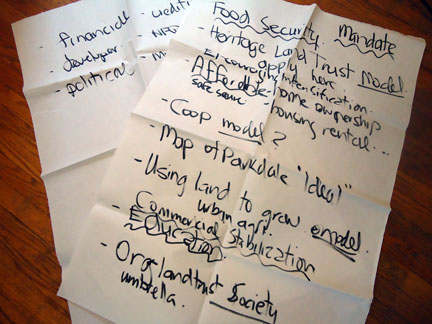LAND OWNERSHIP ARRANGEMENT ALSO EXISTS IN UNITED STATES, EUROPE

Ideas and suggestions about how community land trusts (CLT) form in Parkdale were noted, so that community stakeholders could revisit these ideas down the road. Courtesy Kuni Kamizaki.
By Perry King
A different approach to land ownership is now moving forward in Parkdale.
Held at the Parkdale Activity Recreation Centre (PARC; 1499 Queen St. W.) this month, a small crowd gathered for the first of many meetings to discuss Community Land Trusts (CLT), an alternative, collective land ownership arrangement.
The meeting was organized by PARC and the Parkdale People’s Economy Project—a collaboration between community organizations like PARC, and researchers at the University of Toronto that would look into ways of building a resilient, local economy. The concept of CLTs rose out of initial research that U of T conducted about urban disparities in Parkdale, including housing and food insecurities.
“The reality for many of the people that come to PARC is that they’re living far below the low income cutoff,” said Victor Willis, PARC’s executive director. “If they’re lucky, they’re getting about $13,000 a year, if they’re unlucky it’s about $6,500. We know that the low-income cutoff is 20 to 21.”
The research findings, which recommended ten concepts including CLTs, has now set the stage for making it a reality and combining them with Parkdale’s food security and housing initiatives. “It’s how do we look at urban gardening, within the context of land and moving it into the public sector in a land trust as opposed to it sitting privately,” said Willis.
Susannah Bunce, a professor of Geography and City Studies at U of T, has a robust research background in CLTs and attended the meeting to provide the audience a thorough explanation on what CLTs are and what they can potentially do. First adopted and practiced during the Civil Rights Movement in the American South during the 1960s, CLTs create a mechanism for community ownership of land, and democratic control over how that land is used.
“When you’re going to purchase a home, you’re purchasing the lot as well. The housing unit and the lot becomes yours. With a community land trust, you’re only purchasing the units, not the land,” said Bunce. “It separates land value from housing price, which reduces the overall price of the house.”
Symbolically, the existence of a CLT in Parkdale would keep condo projects at bay, as these land trusts would keep developers from price speculating the land in the area, says Bunce.
At present, Parkdale is at a crossroads. Parkdale is seeing rising property values and decreased numbers of rooming houses and affordable housing. The area is starting to see hints of mass gentrification, said U of T researcher Brendon Goodmurphy. “We can see from a lot of these issues and challenges that these are questions about land,” he said. “This is an issue of who owns the land, and who gets to make decisions about its use and development,” he said.
The presenters believe CLTs could be the way to mitigate the growing disparities. Bunce brought forward three separate case stories from Boston, London, and Calgary to demonstrate how CLTs were a viable option for these neighbourhoods.
With the moderation of Kathy Allen, development consultant and former executive director of the Ontario Land Trusts Alliance (OLTA), attendees gave their feedback on how they would like the CLT to form. “I love the trend of the existing natural heritage land trusts moving towards community because our population in Southern Ontario is growing,” said Allen, also a Parkdale resident. She was excited to help record feedback from attendees.
As a result, the meeting prioritized food security, affordability, education, and commercial stabilization as initial principles to rest on while moving forward with this project.
Although a Parkdale Land Trust has numerous obstacles in order to become one—including acquiring parcels of land, developing a proper business model, and creating an internal democratic process—the future is bright. As Goodmurphy said, the discussion needs to continue outside of these meetings, with people in the community.
For more information about the Parkdale People’s Economic Project and read the study conducted about CLTs, visit www.tinyurl.com/parkdaleclt.
